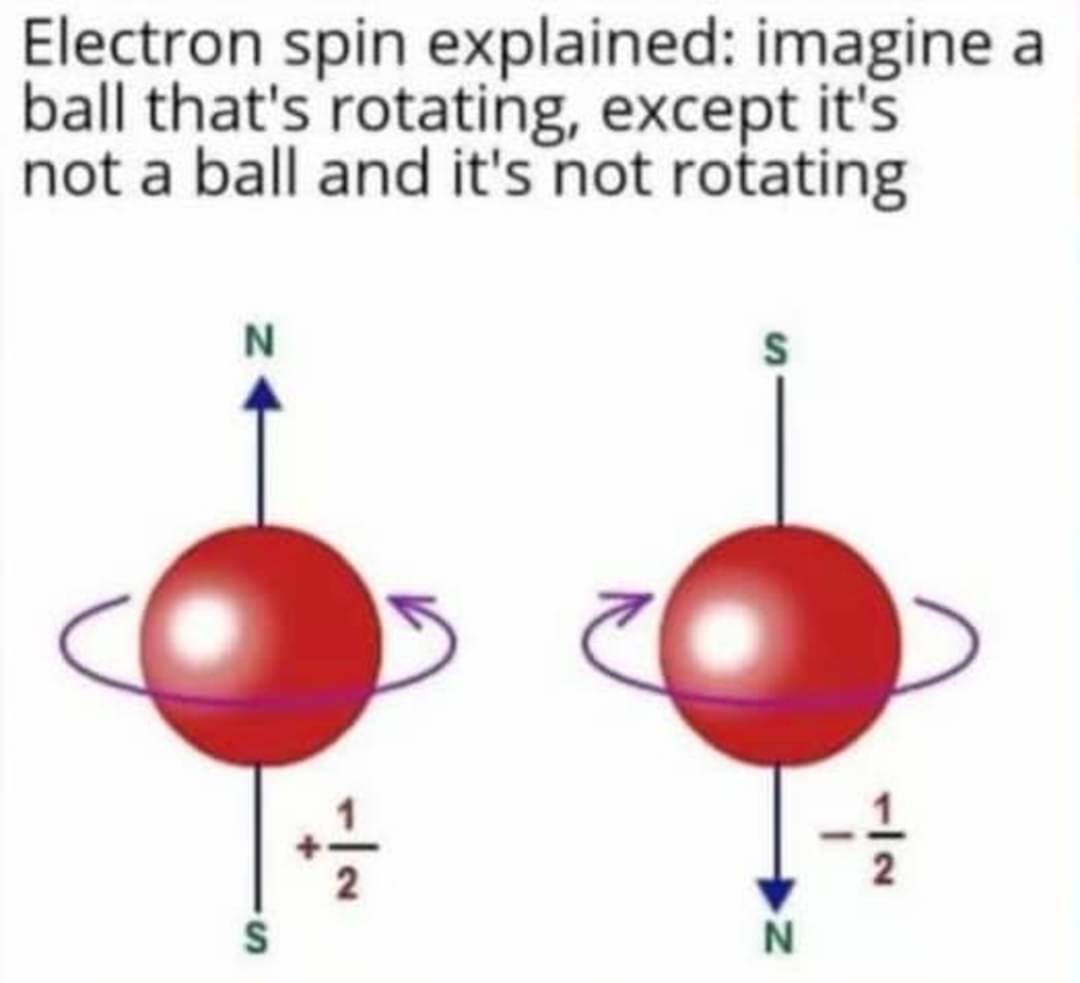"Well... You see... When its a particle it spins. When its a wave its still doing that. How does a waveform spin you ask? Listen. Shut the fuck up. The math is really weird and some of this stuff just happens and you can't visualize it in your head. We didn't believe it at first either but after 50 years of experiments we have to just accept that reality is consistent with the math even if we don't fully conceptualize what that means even"
Science Memes
Welcome to c/science_memes @ Mander.xyz!
A place for majestic STEMLORD peacocking, as well as memes about the realities of working in a lab.

Rules
- Don't throw mud. Behave like an intellectual and remember the human.
- Keep it rooted (on topic).
- No spam.
- Infographics welcome, get schooled.
This is a science community. We use the Dawkins definition of meme.
Research Committee
Other Mander Communities
Science and Research
Biology and Life Sciences
- [email protected]
- [email protected]
- [email protected]
- [email protected]
- [email protected]
- [email protected]
- [email protected]
- [email protected]
- [email protected]
- [email protected]
- [email protected]
- [email protected]
- [email protected]
- [email protected]
- [email protected]
- [email protected]
- [email protected]
- [email protected]
- [email protected]
- [email protected]
- [email protected]
- [email protected]
- [email protected]
- [email protected]
- !reptiles and [email protected]
Physical Sciences
- [email protected]
- [email protected]
- [email protected]
- [email protected]
- [email protected]
- [email protected]
- [email protected]
- [email protected]
- [email protected]
Humanities and Social Sciences
Practical and Applied Sciences
- !exercise-and [email protected]
- [email protected]
- !self [email protected]
- [email protected]
- [email protected]
- [email protected]
Memes
Miscellaneous
We are all just folds in this wonderfully weird thing we call spacetime!
The prions of spacetime.
Out here folding along.
Nice reference to PBS Space Time. The YouTube channel where I just get bullied with science, and for some weird twisted reason I like it.
pbs space time is awesome, and this description is even more so.
Hah! Time. Like that's a real thing.
You seem to be up to date with this stuff; did we find out whether there's more than one yet..?
Personally don't like the idea of everyone reusing the same electon for everything... seems quite unhygienic. I'd rather we had at least one per person, maybe share it with people we trust, if we must...
We have to recycle nowadays. Besides we can't have people throwing away perfectly good electrons. They could end up anywhere.
I've heard this weird concept repeated over and over but I've never once run across it in literature or in speaking to my particle physicist friend. Can you provide a source?
Thank you for the link. It makes sense I haven't heard too much on it. More a postulation than a theory. And kind of untestable/ philosophical too.
You wrote a comment so good that I screenshotted it.
Awww thanks
Also please don't look at it
I mean, you can but it won’t be there.
Actually, it can be there, but then you won't know how fast it's moving.
think of it as a camera.
if you set it up with a high speed to take a picure of a bouncing ping pong ball you will know its precise location at the moment of the shot.
if you set it up with a low speed you will see a blur of the path it took, but not a precise location.
That's not a good analogy because typically cameras don't change the things they're observing. But, a camera with a flash...
Imagine a guy driving down a dark road at night. Take a picture of him without a flash and you'll get a blurry picture.
Take a picture of him with a powerful flash and you'll get an idea of exactly where he was when the picture was taken, but the powerful flash will affect his driving and he'll veer off the road.
You can't measure something without interacting with it. This is true even in the non-quantum world, but often the interactions are small enough to ignore. Like, if you stick a meat thermometer into a leg of lamb, you'll measure its temperature. But, the relatively cool thermometer is going to slightly reduce the temperature of the lamb.
At a quantum level, you can no longer ignore the effect that measuring has on observing. The twin-slit experiment is the ultimate proof of this weirdness.
"All models are wrong, but some are useful." -George Box
My advanced E&M professor said "Imagine a sphere of radius zero. Trust me, it works."
"...Imagine a sphere of radius zero."
and a spherical cow. imagining lots of spherical cows helps quite a bit.
You see, wire telegraph is a kind of a very, very long cat. You pull his tail in New York and his head is meowing in Los Angeles. Do you understand this? And radio operates exactly the same way: you send signals here, they receive them there. The only difference is that there is no cat.
It's a point but it doesn't actually exist at any point. It exists in a cloud where it could exist anywhere in there.
You can observe it but doing so changes its behavior. Why? Well... Um... Maybe it's just the simulation breaking down?
It's because to observe something you have to interact with it. Dealing with particles is like playing pool in the dark and the only way you can tell where the balls are is by rolling other balls into them and listening for the sound it makes. Thing is, you now only know where the ball was, not what happened next.
In the quantum world, even a single photon can influence what another particle is doing. This is fundamentally why observation changes things.
holy shit the pool explanation is so good, I'm gonna recycle it for sure

Good metaphor
I think a lot of the confusion people have is around the word “observation” which in everyday language implies the presence of an intelligent observer. It seems totally nonsensical that the outcome of a physics experiment should depend on whether the physicist is in the lab or out for a coffee! That’s because it is!
I have this beef with a lot of words used in physics. Taking an everyday word and reusing it as a technical term whose meaning may be subtly and/or profoundly different from the original. It’s a source of constant confusion.
Its that an observation is always an energetic interaction. You can't measure a system without interacting with it and at the particle scale every interaction has enough energy to affect the particle in some way. Like when you light up a room you're slightly heating the molecules in it.
If your room is small enough that the light bulb is bigger than the room, this effect becomes very noticable.
Google "Electron Orbitals". All the spaces there are all the ~~possible~~ highest likely locations for the electrons. Good Introduction to some Quantum Mechanics 👍
No! I will not relive the horrors of that chemistry class again... you can't make me. I am happily an aerospace engineer now where I don't need this chemistry nonsense, or quantum mechanics.
Ah let's see, of the top of my head...
~~1s² 2s² 2d⁶ 3s² 2p¹⁰ ...~~
Edited (iirc now, the d block is in the middle with the transition metals, p block with metallics, Halogens, Noble Gases...):
1s² 2s² 2p⁶ 3s² 2d¹⁰ ...
+1/2 h and -1/2 h
Fucking hate the people that insist on using only half of the number as if it was a real value. At least say you are working with natural unities or something.
" - How far is your house? - Oh, it's just 5!"
Except in this context the question is "how many blocks away is your house?" Where "5" is a completely valid response
It's h-bar, not h. And it really does make sense if you look deeper I to the math.
Using "+1/2" and "-1/2" as vector labels is fine. Using it on the context of "the spin can have those 2 values here" for laypeople without further explanation is just making the subject less accessible.
Also, yeah, I was too lazy to search for the unicode ħ.
If we theorize that the universe is like a computer program, then maybe the Universe has several layers of abstraction and we only can access our current layer, therefore forever having an incomplete model. If something external to our layer is affecting it, it would probably be impossible to know.
Quantum mechanics (and spin) isn't really mysterious or inaccessible, it's just not intuitive.
Ahh... hmm. In some ways it is literally inaccessible, because we can't observe it directly. All of our experimental (e.g. real) subatomic knowledge comes from smashing particles into each other at near-light speed and observing the bits that come out, which is somewhat like dropping a smartphone off the Empire State building and trying to figure out how it works by picking up the broken pieces off the sidewalk. We can probe the structure of molecules with electron microscopes, but there are no tools for directly observing anything smaller than that. We draw conclusions for how smaller things behave through inference.
And frankly, the entire concept of spinors and the relationship to observed properties like electron charge is pretty mysterious, and nobody really understands wave-particle duality, that's just the best explanation we have for what we observe.
Now everything is clear. Thanks!
